Organic pest control doesn’t have to mean fruits and veggies riddled with worms. Here’s how to use organic pest control methods to keep your vegetable garden thriving without pest damage — and without poison.
Originally contributed in May 2015 by Angi at Schneiderpeeps; this post has been updated.
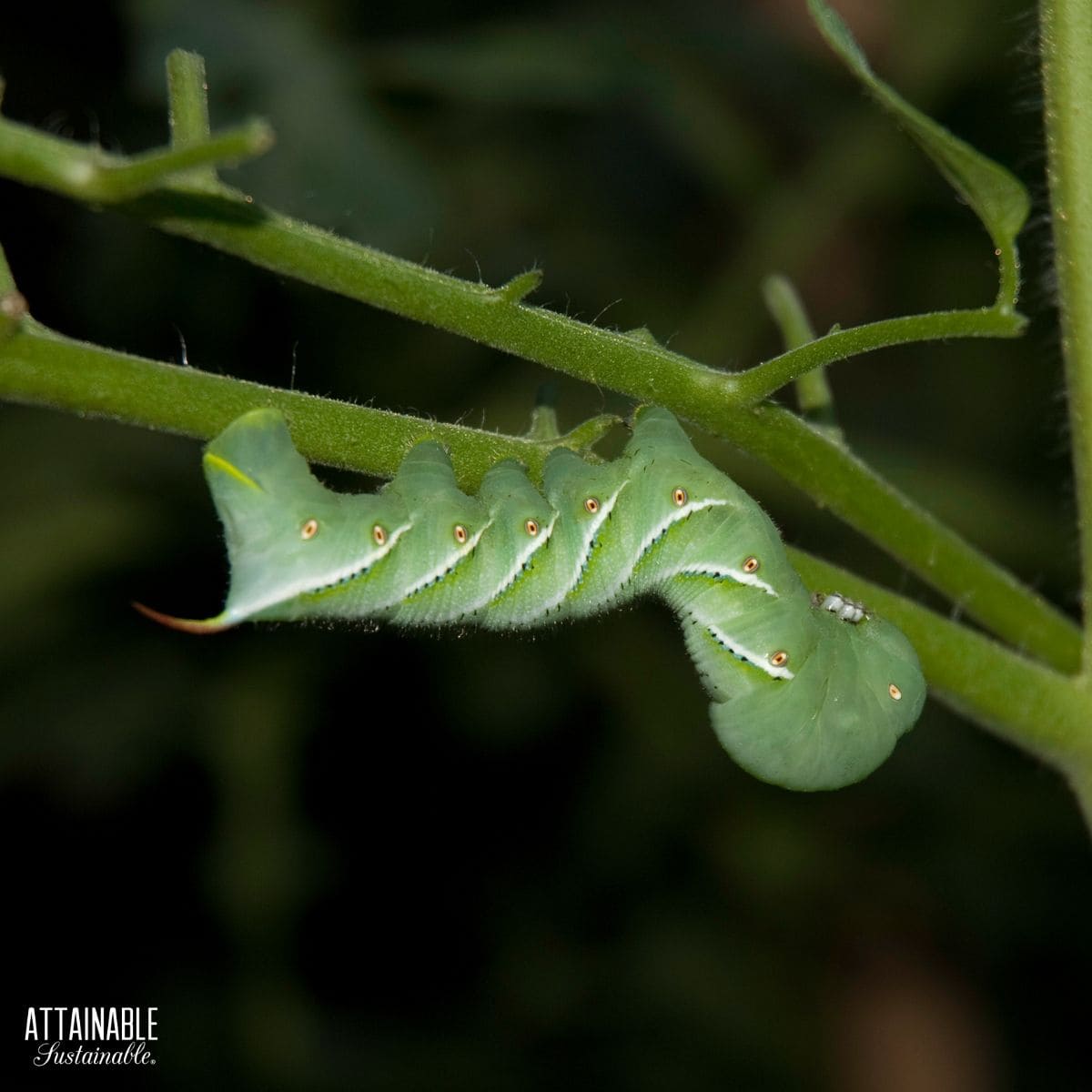
Sometimes organic gardening gets a bad rap. Here’s how a scenario usually plays out. A gardener tills up some ground and plants his favorite plants. He waters and weeds. He notices a few pests but since he’s growing “organically” he leaves them alone.
About mid season his plants are struggling because they are overrun with pests. He’s frustrated and overwhelmed and so runs out and buys a commercial white powder that kills the pests. Within days of sprinkling the powder on the plants, they are doing better and he declares organic gardening a failure.
New to gardening? Limited on space? The 5-Gallon Garden gives you the skills you need to grow food in the space you have. Get started with your garden today!
Organic Pest Control Works
The problem isn’t that organic pest control failed, the problem is that he believed organic gardening meant doing nothing to deter or get rid of pests. On the contrary, organic gardening basically means using the least harmful method of controlling pests and diseases.
It also means that the plant is not looked on as an isolated thing but part of bigger ecological system and doing what’s best for the system as a whole instead of what’s best for just the plant.
Grow Some Greens!
Ready to grow fresh greens, no matter WHERE you live? Sign up for my
FREE quick-start guide and start growing some of your own food!
So how can you put organic pest control to work in your garden?
Build the Soil
Growing great plants always starts with soil. If you have dead soil because you’ve killed every living thing but your plant, the plant will not thrive.
Each year you will have to add more and more fertilizer to get the same results. Building your soil takes time but if you will stop tilling and start adding compost your soil will become healthy over time.
Healthy soil = healthy plants.
Related: 5+ Tactics for Natural Mosquito Control
Rotate Crops
Don’t make it easy for the pests to find your plants by planting the same plants in the same spots year after year. Crop rotation is the idea of moving different types of plants to a new area each year.
This means that insect pests that prefer a certain kind of crop will have to look harder to find those plants in the next growing season.
Here is a simple order for rotating crops – legumes, leaf crops, fruiting crops, root crops.
No one does this perfectly so don’t get all hung up on it, just try to not plant the same thing in the same spot year after year. It’s an easy tactic for organic garden pest control.
Related: How to Get Rid of Fruit Flies Naturally
Plant Some Companions
There are some plants that pests just don’t like. Radishes will deter cucumber beetles, borage will deter tomato hornworms and cabbage moths, onions and garlic have a strong smell and can be planted throughout the garden.
Some plants can be planted as a trap plant for pests, making them an ally in your efforts in organic pest control. Sunflowers will keep aphids occupied and off other plants, hyacinth beans will do the same for leaf footed bugs.
Other plants will attract beneficial bugs to your garden. Chamomile and buckwheat both attract bees and ladybugs. And guess what ladybugs like to eat….aphids. So mix up your beds, you don’t need to have nice neat row crops to have a successful garden. [More about companion planting here.]
Related: Common Plant Diseases and Problems to Look For
Pick Varieties that Naturally Discourage Pests
If you have trouble with vine borers pick a variety of squash that has a thinner or harder stem; butternut squash, green striped cushaw, Dickenson pumpkin and summer crookneck are somewhat resistant to vine borers.
To discourage corn earworms, choose tightly husked varieties such as ‘Country Gentlemen’ and ‘Victory Golden’. We’re not talking about GMO seeds, just varieties that naturally make it hard for pests to attack. Choosing the right plants can make all the difference.
Encouraging Beneficial Insects
Not all bugs or insects are harmful. In fact many are beneficial and natural predators of some garden pests. Ladybugs and hoverflies eat aphids. Parasitic wasps kill tomato hornworms. Paper wasps, spiders, and many other bugs and insects are very good for your garden.
If you use harsh chemicals or a commercial all inclusive pest control powder, you’ll kill all the beneficial bugs and insects in your garden and you don’t want to do that.
Be sure to plant flowers that attract these bugs and insects. Dill, tansy, coriander, Queen Anne’s lace, yarrow, buckwheat, sunflowers, sweet alyssum, lemon balm, and marigolds are wonderful choices.
Related: Banish Japanese Beetles from your Garden
Get Physical
Sometimes you just have to get physical with pests. Nets or row covers over cabbage will keep the moths from laying eggs on them, making them a good organic pest control method. Crushed eggshells can be put around the base of plants to keep slugs away.
Metals cans (with both ends cut off) can be put over tender seedlings and pushed into the soil a bit; these physical barriers help to keep cutworms at bay.
To help with a pill bug infestation, put a teaspoon of yeast, a teaspoon of sugar and 1/2 cup of water into an 8 ounce jar and bury the jar up to the lip. The pill bugs are drawn to the smell and will drown. Change out the jar every couple of days. Also, looking for insect eggs on the underside of leaves and squishing them is an effective way to reduce pests in the garden.
Use Caution
There are some organic pesticides that can be used in the garden to manage your pest problem. Instead of covering the entire plant with a product that kills a wide range of pests, use a spray or powder that targets just the pest you are dealing with. Some natural insecticides to consider:
- Bt (bacillus thuringiensis) is a bacteria that only targets caterpillars and worms. It comes in a powder and a spray and is very useful for things like cabbage worms (aka cabbage loopers) and tomato hornworms.
- DE (Diatomaceous Earth) is a natural substance that is wonderful for handling soft-bodied insects such as aphids, ants, thrips, mites, earwigs, snails and slugs. Unfortunately, it can also be harmful to other insects such as lady bugs and bees.
- Neem oil (like this) is made from the seeds of the neem tree and can be used as a preventative spray for pests that eat leaves like aphids, mites, squash bugs, Colorado potato beetles and Mexican bean beetles.
- Sprays made of garlic and hot peppers are natural ways to deal with creepy crawlies – but they are indiscriminate and will kill beneficial insects along with pests. So be careful using these.
Choose Natural Pest Control
It takes more time and more thought to grow food organically but it’s better for the ecosystem and your family to avoid harsh chemical pesticides. Over time you will figure out what works best for you and your garden. Just remember to keep notes while you’re learning.
Related: How to Get Rid of Fruit Flies
Angi Schneider is a minister’s wife and homeschooling mom. She is passionate about growing food for her family and living a simple life. She blogs their homesteading and homeschooling adventures at SchneiderPeeps.com and is the author of The Gardening Notebook which she wrote to help other gardeners remember all the great information they are learning.
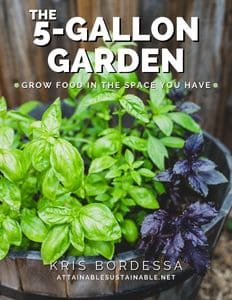
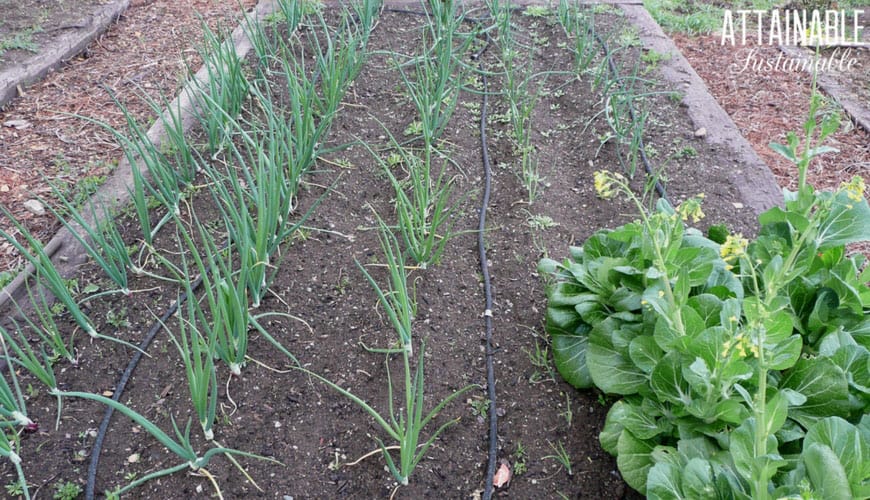
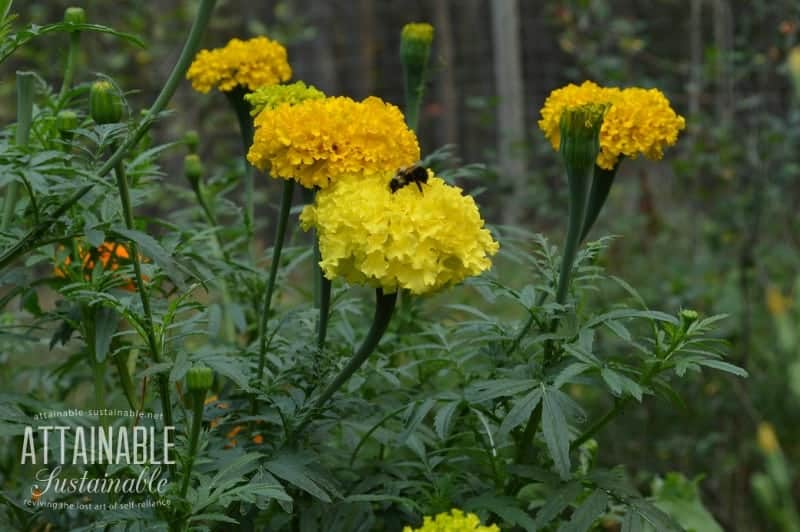
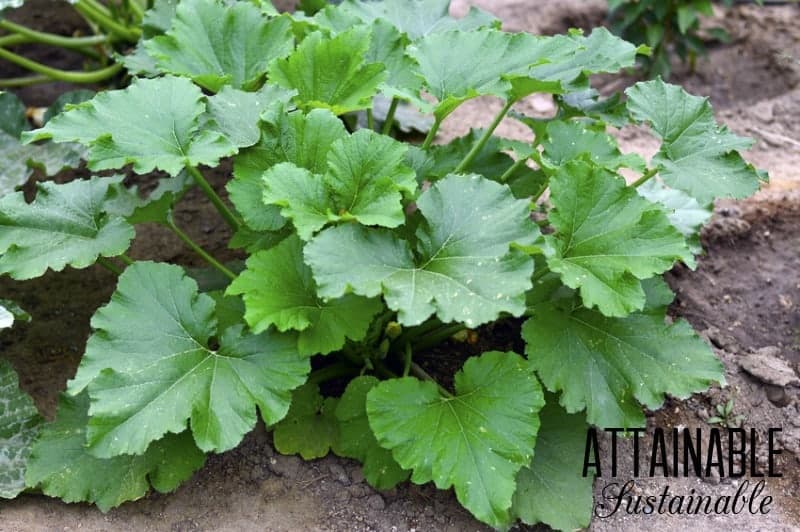
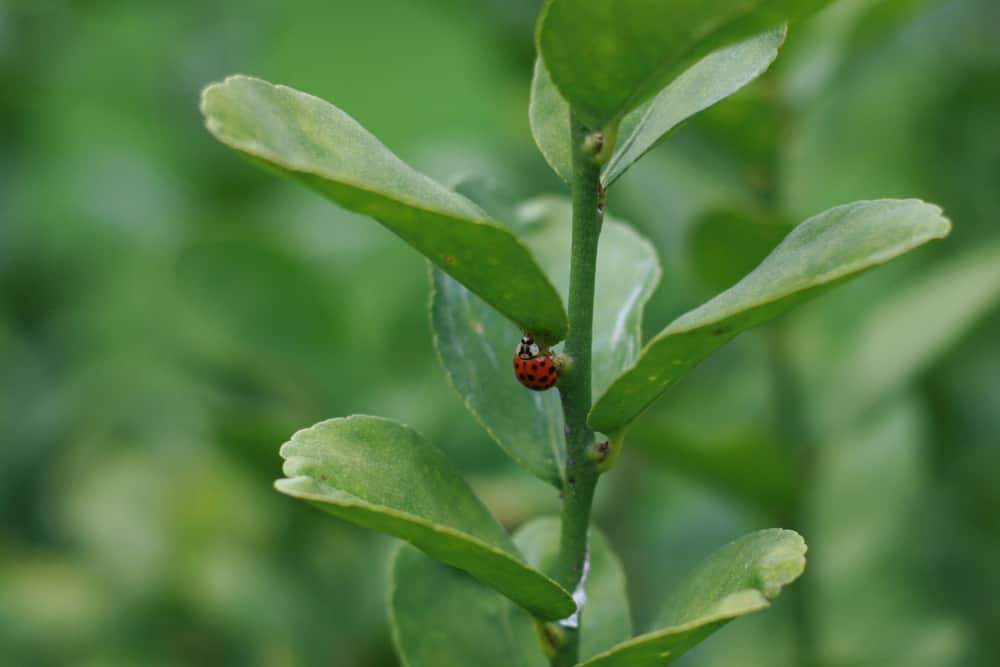
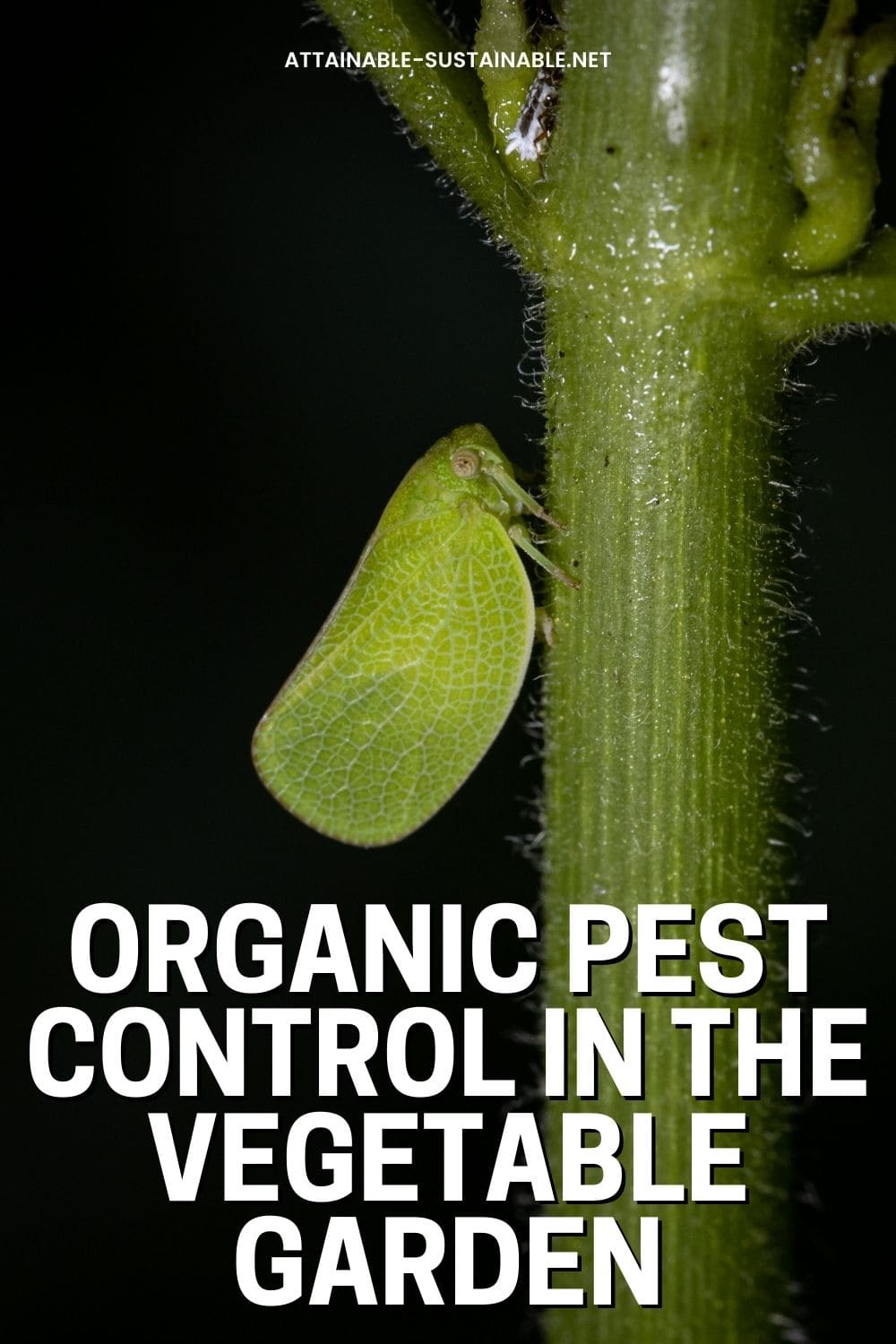

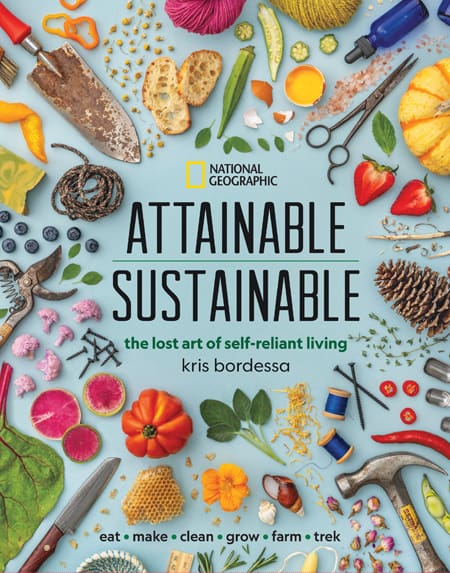
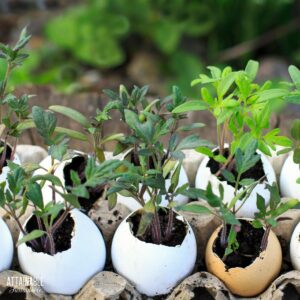
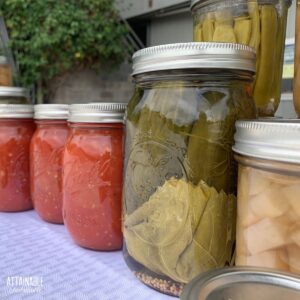

Pill bugs/ Rollie Pollys are beneficial!! They eat decaying matter and are not harmful to any living plants, and they also aerate soil when they burrow during the day. They are great little guys to have around 🙂
I agree, to a point. They are *mostly useful. I have lived in locations where their numbers were so many that they also ate all the living garden plants. (Headlamp at night to verify.)
I have problems with the Rolly Polly bugs and small snails in grass that get to my flowers & Vegetables. There are black ants that are stripping my leaves to the point the plant dies. I use Diatomaceous Earth but the black looking ants just walk thru it like its not a problem for them. I refuse to use poisons ANYWHERE that I plant food. We do poison around the outside of the house but no where else. I have a lot of lizards that eat at my house in the evening so I try to do natural ways even if I lose the battle. I hand pick as many snails & Rolly Polly bugs as I can and put snails in a jar with lots of salt. Rollys I just put in jar until they die then throw them away. But can’t get rid of them sorry to say. The other problem is the shield like stink bugs(?) Those I catch in a bag and step on them every time I see them but they do have a strong smell that’s for sure!!!! There are some other bugs but these few above do the most damage. Any helpful ideas???
Have you tried neem oil? Otherwise, I’d keep up on your soil, companion planting, and crop rotation. Good luck!
Plant cleome as a sacrifice plant for green shield bugs. They are attracted to that plant first. Lovely flowers to have in your garden and self seed for next year
Spiders may not be harmful but I have a terrible fear of spiders. Would it be horrible if i wanted to get rid of them? I don’t like walking between two bushes or trees only to realize I have walked through a spider web. Any suggestions?
I don’t like walking through spider webs either! I walk around with a stick and knock down the webs where I’ll be walking; it tends to discourage them when I do this repeatedly; they seem to move elsewhere. I think it would be fine to discourage them, especially if it will mean you spend more time in the garden!
Good advice about knocking down webs? Should do especially around hummingbird feeders, so they don’t get them on their wings.
use ecofrieindly products for pest control.
I agree with you about “Not all bugs or insects are harmful”. Ladybug can eat mealybugs. This is a simple method that get rid of a mealybug infestation in garden.
Any suggestions for getting rid of mealy bugs an orchid plants? Have been using a mixture of Dawn and water to bathe plants when I see the bugs. Kills/removes visible bugs, but they seem to return in two to three weeks.
They are probably in your soil. You could try repotting the plant with brand new soil. totally wash away the bugs. You may have them on other plants? In that case, you would have to treat all plants. I had this problem on elephant palms. I eventually had to throw them all away.
Superb article! An additional method of combating pests is balancing the minerals in your soil. All eleven of the mineral nutrients naturally occurring in every soil, are available in a form approved for organic use by the USDA National Organic Program. When soil minerals are in optimum balance, the soil is at its peak fertility, and the plant leaf sap reaches 12 Brix. At 12 Brix and above, the plants are at their healthiest and most vigorous. Pests don’t bother healthy plants. Maximize soil fertility through mineral balance, follow the advice in this article, and enjoy pest free gardening.
We tried to stave off cucumber beetles from the beginning. Planted radish all around our cucumber. Our radish beds have been more ravaged by the cucumber beetles than the cucumber. I think these recommendations are awesome, but they have never worked very well for me. I use BT and Spinosad (very sparingly and only in the evening) and this has saved my garden.
Totally agreed with you. Natural and organic methods should always come first before anything else. Something like biological pest control really benefits us without disrupting our environment.
The best thing Ive ever done in my garden was companion plant coriander and my brassicas – the coriander helps keep the dreaded white cabbage moth at bay! https://bit.ly/1lRYMoo
Really interesting and helpful article. Just to comment none of the bean family grow well near any of the onion family. Also our modern practice of feeding birds all year round means that they have a ready-made snack bar and don’t feast on the aphids, etc! Of course feed them in the cold and wet weather but let them play their part in the natural cycle of growing.
Good point about the bird buffet.
Nicely done, Angi! Great info here. Had to share. And thanks for hosting it, Kris! Both you ladies are awesome! Love, Jo & Eddie
Thanks, Jo!
Hi, thanks for this – great advice. Please reconsider the use of tin cans though – the use of them can result in some horrendous damage to wildlife such as hedgehogs etc.
Can you elaborate? We don’t have hedgehogs here…